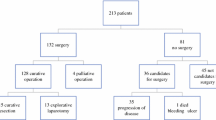Abstract
Background: In order to evaluate the impact of preoperative radiation and chemotherapy (combined modality therapy, or CMT) on primary rectal cancer and mesorectal lymph nodes (MLNs), middle and lower third rectal cancers were resected with total mesorectal excision (TME) and assessed for frequency of MLN retrieval and residual MLN involvement.
Methods: Between 1990 and 2001, 187 consecutive patients underwent abdominoperineal resection (APR) or low anterior resection (LAR) for locally advanced (endorectal ultrasound [ERUS] stage, T3–4) mid and distal rectal cancer following preoperative CMT. Sphincter preservation was possible in 150 patients (80%). The mean number of retrieved MLNs was 10.6. Pre-CMT ERUS stage was compared with final pathologic stage.
Results: Comparison of pre-CMT ERUS stage with pathologic stage revealed a decrease in T stage in 93 patients (49%), as well as a decrease in the percentage of individuals with positive MLNs, from 54% to 27% (P < .0001). The overall incidence of positive MLN involvement was 27%, and incidence paralleled pathologic T stage (pT): pT0 = 7%, pT1 = 8%, pT2 = 22%, pT3 = 37%, and pT4 = 67%.
Conclusions: Following preoperative CMT, the incidence of residual MLN involvement remains significant and parallels increasing pT stage. Therefore, the standard of care for locally advanced distal rectal cancer should continue to include formal rectal resection (TME).
Similar content being viewed by others
References
Kim CJ, Yeatman TJ, Coppola D, et al. Local excision of T2 and T3 rectal cancers after downstaging chemoradiation. Ann Surg 2001;234:352–8; discussion, 58–9.
Mohiuddin M, Marks G, Bannon J. High-dose preoperative radiation and full thickness local excision: a new option for selected T3 distal rectal cancers. Int J Radiat Oncol Biol Phys 1994;30:845–849.
Schell SR, Zlotecki RA, Mendenhall WM, Marsh RW, Vauthey JN, Copeland EM 3rd. Transanal excision of locally advanced rectal cancers downstaged using neoadjuvant chemoradiotherapy. J Am Coll Surg 2002;194:584–90; discussion, 90–1.
Ruo L, Guillem JG, Minsky BD, Quan SH, Paty PB, Cohen AM. Preoperative radiation with or without chemotherapy and full-thickness transanal excision for selected T2 and T3 distal rectal cancers. Int J Colorectal Dis 2002;17:54–58.
Medical Research Council Rectal Cancer Working Party. Randomised trial of surgery alone versus radiotherapy followed by surgery for potentially operable locally advanced rectal cancer. Lancet 1996;348:1605–10.
Improved survival with preoperative radiotherapy in resectable rectal cancer. Swedish Rectal Cancer Trial. N Engl J Med 1997;336:980–7.
Hildebrandt U, Feifel G, Schwarz HP, Scherr O. Endorectal ultrasound: instrumentation and clinical aspects. Int J Colorectal Dis 1986;1:203–207.
Beynon J, Roe AM, Foy DM, Channer JL, Virjee J, Mortensen NJ. Preoperative staging of local invasion in rectal cancer using endoluminal ultrasound. J R Soc Med 1987;80:23–24.
StatXact for Windows: statistical software for exact nonparametric inference. Cambridge, MA: Cytel Software Corporation, 1997.
McNemar Q. Note on the sampling error of the difference between correlated proportions or percentages. Psychmetrika 1947;12:153–157.
Ruo L, Tickoo S, Klimstra DS, et al. Long-term prognostic significance of extent of rectal cancer response to preoperative radiation and chemotherapy. Ann Surg 2002;236:75–81.
Garcia-Aguilar J, Hernandez de Anda E, Sirivongs P, Lee SH, Madoff RD, Rothenberger DA. A pathologic complete response to preoperative chemoradiation is associated with lower local recurrence and improved survival in rectal cancer patients treated by mesorectal excision. Dis Colon Rectum 2003;46:298–304.
Bozzetti F, Andreola S, Baratti D, et al. Preoperative chemoradiation in patients with resectable rectal cancer: results on tumor response. Ann Surg Oncol 2002;9:444–449.
Minsky BD, Rich T, Recht A, Harvey W, Mies C. Selection criteria for local excision with or without adjuvant radiation therapy for rectal cancer. Cancer 1989;63:1421–1429.
Winde G, Nottberg H, Keller R, Schmid KW, Bunte H. Surgical cure for early rectal carcinomas (T1): transanal endoscopic microsurgery vs. anterior resection. Dis Colon Rectum 1996;39:969–976.
Blumberg D, Paty PB, Guillem JG, et al. All patients with small intramural rectal cancers are at risk for lymph node metastasis. Dis Colon Rectum 1999;42:881–885.
Paty PB, Nash GM, Baron P, et al. Long-term results of local excision for rectal cancer. Ann Surg 2002;236:522–9; discussion, 29–30.
Hiotis SP, Weber SM, Cohen AM, et al. Assessing the predictive value of clinical complete response to neoadjuvant therapy for rectal cancer: an analysis of 488 patients. J Am Coll Surg 2002; 194:131–5; discussion, 35–6.
Meterissian S, Skibber J, Rich T, et al. Patterns of residual disease after preoperative chemoradiation in ultrasound T3 rectal carcinoma. Ann Surg Oncol 1994;1:111–116.
Napoleon B, Pujol B, Berger F, Valette PJ, Gerard JP, Souquet JC. Accuracy of endosonography in the staging of rectal cancer treated by radiotherapy. Br J Surg 1991;78:785–788.
Barbaro B, Schulsinger A, Valentini V, Marano P, Rotman M. The accuracy of transrectal ultrasound in predicting the pathological stage of low-lying rectal cancer after preoperative chemoradiation therapy. Int J Radiat Oncol Biol Phys 1999;43:1043–1047.
Rau B, Hunerbein M, Barth C, et al. Accuracy of endorectal ultrasound after preoperative radiochemotherapy in locally advanced rectal cancer. Surg Endosc 1999;13:980–984.
Williamson PR, Hellinger MD, Larach SW, Ferrara A. Endorectal ultrasound of T3 and T4 rectal cancers after preoperative chemoradiation. Dis Colon Rectum 1996;39:45–49.
Guillem JG, Puig-La Calle J Jr., Akhurst T, et al. Prospective assessment of primary rectal cancer response to preoperative radiation and chemotherapy using 18-fluorodeoxyglucose positron emission tomography. Dis Colon Rectum 2000;43:18–24.
Habr-Gama A, de Souza PM, Ribeiro U Jr, et al. Low rectal cancer: impact of radiation and chemotherapy on surgical treatment. Dis Colon Rectum 1998;41:1087–96.
Nakagawa WT, Rossi BM, de OFF, et al. Chemoradiation instead of surgery to treat mid and low rectal tumors: is it safe?. Ann Surg Oncol 2002;9:568–573.
Onaitis MW, Noone RB, Fields R, et al. Complete response to neoadjuvant chemoradiation for rectal cancer does not influence survival. Ann Surg Oncol 2001;8:801–806.
Author information
Authors and Affiliations
Corresponding author
Rights and permissions
About this article
Cite this article
Stipa, F., Zernecke, A., Moore, H.G. et al. Residual Mesorectal Lymph Node Involvement Following Neoadjuvant Combined-Modality Therapy: Rationale for Radical Resection?. Ann Surg Oncol 11, 187–191 (2004). https://doi.org/10.1245/ASO.2004.06.010
Received:
Accepted:
Issue Date:
DOI: https://doi.org/10.1245/ASO.2004.06.010




